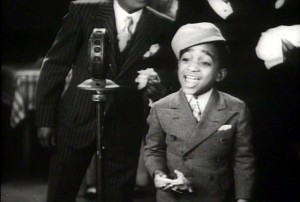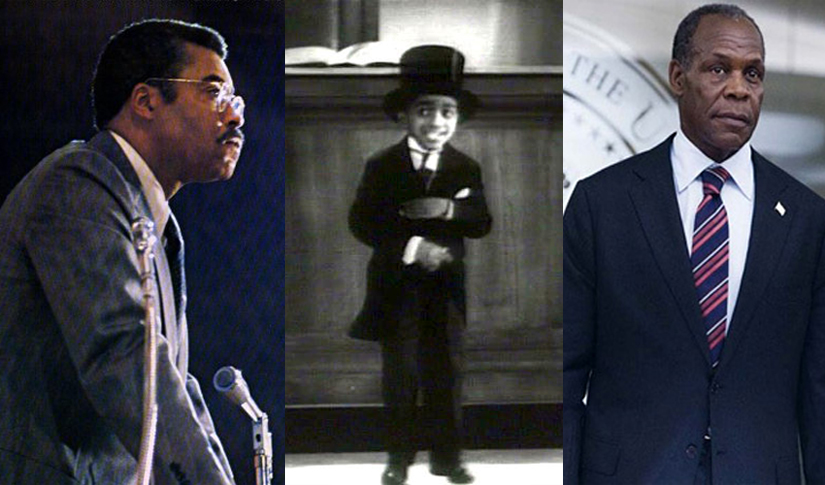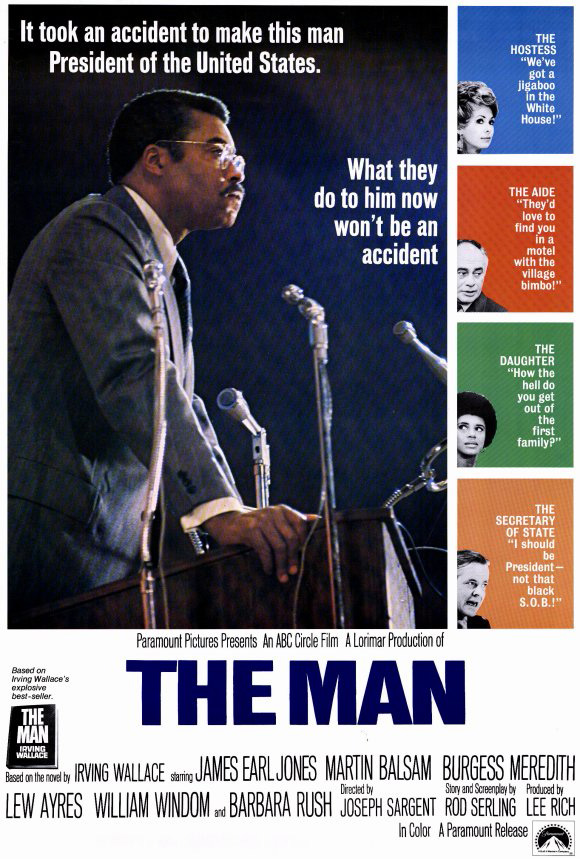by Curtis Caesar John
If I was president
I’d get elected on Friday
Assassinated on Saturday
Buried on Sunday,
then go back to work on Monday
Lyrics from ‘President’ by Wyclef Jean *
Today here in the US of A is President’s Day, a holiday more famous these days for great sales on electronics than for the celebration of the (still only) men who ran and represented this country as the commander-in-chief. Now that the United States has a Black (or technically mixed race) President since 2008, I thought I’d reexamine the ways Black Presidents have been represented in cinema over the years. For the sake of straight up narratives, I’m omitting any biopics of non-Unite States presidents despite fantastic films like Raoul Peck’s Lumumuba.
We know some of the basics cinema tenants for this – a Black man can only be President when the world is coming to an end, a la Morgan Freeman in 1998’s disaster film Deep Impact. Other than the dastardly concept of the film, in which he actually made it to the end of when usually the main Black character does not given the level of disaster, Freeman’s performance was powerful as he kept America as calm as possible amidst two meteorites on their way to make life on the planet inhospitable for years. I won’t even rate this one, but it’s a general enough film you may have caught in the theaters, on cable, or even broadcast television to give you a ‘middle’ of what’s expected of a Black president (I won’t get on a soapbox to expound on what President Obama’s expectations continue to be).
One of the earliest examples of a Black president is the 1933 musical film short Rufus Jones for President, a would-be satirical look of a young Black boy who is told he can be anything, including the President of the United States. Played by the young Sammy Davis Jr. in his first film role (here simply billed as Sammy Davis) little Rufus is assaulted with cake after going into a neighbors yard, and to calm him his mother, played by the fantastic yet still greatly unsung singer/actress Ethel Waters, serenades Rufus as they both dream about his future as the potential president.
Rufus’ acceptance speech, given in an un-presidential shack, is an incomprehensible but entertaining whine from Sammy as he holds a piece of fried chicken in his hands. Yes, I just wrote that. This is followed by Rufus’ inauguration in which a rapping officiate asks the President-elect to swear on certain tenants including that, pork chops be free, the tax on razor blades be reduced, and the utterly deplorable,”…Swear to me that watermelon vines, are public property all the time…” to which Rufus joyfully expresses in between all requests, while dancing in place, “I do, I do.” There is much more to be taken aback to, like the next scene where Black men are playing craps on the congressional floor, but you should really see it for yourself.

Sammy Davis Jr. in ‘Rufus Jones for President’
Now when doing an assessment of a film like this, one is often asked to think first about the why’s and when’s, including given the time period whether this film was made to be insulting or was intended just to be pure entertainment. Arguments can be made for the latter, and one can imagine that young Black children watching the film short may have imagined that just hearing a loving mother express the words that Rufus can be President may have had a positive effect on them. But despite it being a comedy, with the congressman asking for a ‘poultry commissioner’ and ‘watermelon inspector’ this film is not really the satire some may say it is but mainly a play on stereotypes used to entertain the masses reminiscent of the divisibly racist film ‘classic’ The Birth of a Nation.

Still, as blogger Crystal J. Anderson points out, the film is “a historical timepiece. The comedy is funny, the acting, dancing, and singing superb, particularly from Sammy Davis Jr.” And for me, nothing beats seeing a young Ethel Waters, not totally beaten down by the Hollywood system yet, quite joyful, robust, and dare I say, sexy.
Yet I can’t let the overt racism pass, so I give this film a hearty NO!! and WHY?!?
See the film in its entirety on Archive.org or DailyMotion.
More ‘appropriate’ is 1972’s The Man starring James Earl Jones as Douglas Dilman, the Senate president pro tempore of the United States, who after the President and Speaker of the House are killed in a building collapse, and the Vice-President declines the post due to his old age and ill-health, becomes the first Black men to assume the duties of the Oval Office.
Oddly enough there is no online trailer of the film, but thanks to our friends on YouTube the movie is fully available online, in full and in multiple parts. Two telling parts of the film are the intro, with a cameo from comedian Jack Benny and a wonderfully crafted still shot when Dilman discovers he is the new President, and the third where is he is at first overwhelmed by his new responsibilities but soon, after an illuminating meeting with some Black congressional leaders, comes into his own. That Black congressman scene is also telling in that it features grossly underrated actor Lawrence Cook, the titular character from the film classic The Spook Who Sat By The Door.
Despite looking un-cinematic because it was intended as a TV movie but put on screens because of ‘misgivings’ from Southern broadcasters, with its serious approach to the topic of a Black president of the United States, I wholeheartedly give the John Sargent directed, “The Twilight Zone” creator Rod Serling’s screenplay adaptation of the Irving Wallace novel ‘The Man’ a resounding… YES!
Lastly, December 21, 2012 marked the end of the world…because Danny Glover is the President!
Okay, that’s not the exact plot to director Roland Emmerich’s 2012, released in 2009 in order to satisfy believers in the Mayan legend that the Earth will be destroyed on that day in that year. It may have been made to also, as per my speculation, satisfy the director’s penchant for disaster films with 2012 being his third ‘end of civilization as we know it’ film after Independence Day (1996) and The Day After Tomorrow (2004). Nonetheless, Danny Glover does play President Thomas Wilson. Even though the trailer barely shows him, we can assume he barely matters to the plot unlike the lead John Cusack who plays Jackson Curtis, the POV character who struggles to keep his family alive when the catastrophes of the legend come true.

From the look of the trailer it looks like President Wilson probably does not survive given that The White House and what appears to be Air Force One are dramatically destroyed. I should note that Emmerich also recently directed last year’s White House Down, another co-starring a Black United States president, with Jamie Foxx playing the damsel-in-distress to Channing Tatum who saves the prez after paramilitary invaders take over the White House.
So check out the trailer for 2012 yourself, but I have to give it a…NO!!
So apparently, being a Black President, young or old, isn’t all its cracked up to be. Let us know what you think of this edition of Yes! No!! Why?!? in the comments section below. See you next time!
*And yes, I do realize I’m sort of quoting two different rappers at the top of the article with a play on lyrics from Nas’ “The World is Yours” in the title and quoting Wyclef right underneath. Writing is an art baby, enjoy the process.



